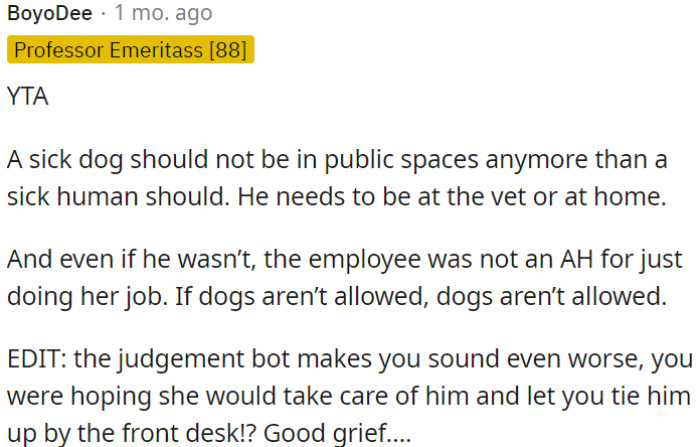Woman Takes Old Dog Into No-Pets-Allowed Store Because The Outside Temperatures Could Damage Its Health, Gets No Understanding From Workers There
There are differing opinions on whether pets should be allowed in stores. Supporters of the ban argue that it upholds cleanliness and prevents potential disruptions. Opponents stress the emotional connection between owners and pets, advocating for inclusivity.
Balancing these viewpoints presents a challenge. Instances like OP's dilemma, where a pet's presence is vital for their well-being, emphasize this complexity.
In a heartfelt incident that unfolded at a local store, a dog owner found herself in a difficult situation when attempting to bring her ailing dog inside. OP (32F) was out with her beloved dog named Joey. Despite the circumstances, this simple errand turned into a tussle between compassion and store policy.
Joey, a faithful companion for over a decade, has been facing health challenges as he ages. Determined to ensure his well-being, OP decided to make a quick stop for groceries. However, her intentions were met with an unexpected confrontation at the store entrance.
A young lady, presumably a store employee, challenged OP's entry with Joey. This encounter took an unfortunate turn, with the employee adhering strictly to the store's no-dogs policy. Despite OP's attempts to explain Joey's condition and his gentle demeanor, the employee stood firm, emphasizing her role as a rule enforcer.
The situation left OP torn between her loyalty to Joey's needs and respecting the store's regulations. Faced with the dilemma, OP eventually chose to leave the store, prioritizing her dog's well-being over her own convenience.
OP brought her elderly and unwell canine companion to the shop, but unfortunately, they were not received warmly or hospitably.

OP decided to leave the store

Rules exist for a reason.

The Intersection of Pet Care and Public Spaces
Behavioral psychologists emphasize that the treatment of pets in public spaces often reflects underlying societal values and norms.
Research has shown that individuals' decisions regarding pet care can be influenced by perceived social expectations.
Understanding these societal pressures can help individuals navigate conflicts when interacting in public settings.
The Emotional Bond Between Owners and Pets
The situation involving the elderly dog highlights the significant emotional bond that exists between pets and their owners. According to Dr. James Serpell, an expert in animal behavior, the attachment that people develop with their pets can greatly influence their decisions and actions. In this case, the owner’s decision to bring the dog into a no-pets-allowed store may stem from a deep-seated belief that their pet’s well-being is paramount.
Research shows that pets often serve as emotional anchors, providing comfort and companionship, particularly for individuals facing stressful situations. This emotional connection can lead owners to prioritize their pets' needs over societal rules, especially in crisis situations.
Sick dogs shouldn't be in public, just like sick humans.

If OP's dog is sick, she should avoid bringing him inside a shop.

Regulations are binding for all individuals, regardless of whether the circumstances are unfavorable.

Studies indicate that individuals often feel compelled to comply with social norms, which can lead to tensions in public spaces.
Recognizing these dynamics can help individuals approach conflicts with more empathy and understanding.
Encouraging open dialogues about expectations can promote healthier interactions in public settings.
However, this scenario also raises important questions about social norms and the responsibilities of pet ownership. Studies in social psychology indicate that individuals may struggle to balance personal attachments with societal expectations. The store workers’ reactions reflect a broader societal perspective on pet ownership, emphasizing the importance of adhering to rules for the greater good.
Understanding both perspectives—those of the owner and the store employees—can foster greater empathy in these situations and promote more constructive discussions about pet policies.
No exceptions for pets, even if they are old.

OP should leave her dog at home when she goes to the grocery store

If OP prefers not to leave the dog by itself during shopping, she should explore different options for her shopping plans.

Practicing Empathy in Public Spaces
Empathy is crucial in navigating conflicts regarding pet care in public settings.
Research shows that individuals who practice empathy are better equipped to handle disagreements and misunderstandings.
Encouraging individuals to express their feelings openly can foster understanding and cooperation.
Navigating Conflicts Between Emotional Needs and Social Norms
When emotional needs clash with social norms, conflicts can arise that necessitate careful navigation. Research in conflict resolution emphasizes the importance of open communication in addressing these tensions. The owner may benefit from expressing their concerns about the dog’s health while also acknowledging the store’s policies, promoting a more understanding dialogue.
Engaging in discussions about the reasons behind pet policies can also foster greater understanding between pet owners and businesses, potentially leading to more flexible solutions.
No dogs allowed means no dogs allowed

OP must avoid bringing her sick dog into food areas, even if an employee smirks.

No special treatment for sick dogs

Experts recommend that individuals engage in conflict resolution strategies to promote healthier interactions in public spaces.
Implementing techniques such as active listening and collaborative problem-solving can help manage disagreements effectively.
These strategies can lead to more positive outcomes and improved relationships.
Additionally, encouraging empathy and understanding in such situations can lead to more compassionate responses from both parties. Research indicates that fostering empathy can help mitigate conflicts and promote better relationships between individuals. By encouraging the store employees to consider the owner’s perspective, a more supportive environment may emerge.
Creating spaces where individuals can express their needs and concerns openly can facilitate understanding and reduce tensions.
While we really love our pets and feel a strong bond with them, it's important to remember that stores have rules to follow. These rules are there for reasons such as keeping the place clean and organized.
The worker who told OP that pets aren't allowed was just doing her job. She wasn't doing anything wrong by following the store's rules. It's important to understand this. Workers have a responsibility to ensure that everyone has a good shopping experience, and that includes following the rules.
If a pet needs to be with you because it's not feeling well, it's a good idea to plan ahead. Maybe you can order things online or ask someone to stay with your pet outside.
The Importance of Compassionate Advocacy for Pets
Advocating for the rights and well-being of pets is a vital aspect of responsible pet ownership. Research in animal welfare emphasizes that pet owners have a responsibility to ensure their animals are cared for appropriately, particularly in stressful situations. The owner in this scenario might consider exploring alternative solutions, such as advocating for pet-friendly policies in stores to prevent future conflicts.
Engaging with local businesses to promote understanding and compassion for pet owners can lead to more inclusive environments where pets are welcomed without compromising safety.
Psychological Analysis
The owner's decision to bring the elderly dog into a no-pets-allowed store reflects a deep emotional bond that many pet owners experience. While it's essential to respect store policies, understanding the emotional context can foster more compassionate responses. Encouraging open dialogue between pet owners and businesses can lead to positive outcomes for all involved.
Analysis generated by AI
Analysis & Alternative Approaches
This situation illustrates the complexities surrounding the emotional relationships between pets and their owners, particularly when societal norms come into play. As research indicates, fostering empathy and understanding can help navigate these conflicts. By advocating for pets' rights while respecting social expectations, pet owners can work towards creating a more compassionate environment for all.
The Importance of Setting Boundaries in Public Spaces
Setting boundaries is crucial in public interactions, especially when it involves pet care.
Research indicates that individuals who establish clear boundaries experience greater satisfaction in their relationships.
Encouraging open discussions about pet care expectations can help clarify misunderstandings and promote cooperation.
Psychological Analysis
This situation illustrates the complexities of navigating public interactions around pet care.
Encouraging empathy and clear communication can help individuals manage conflicts more effectively and foster positive relationships.
Analysis generated by AI
Analysis & Alternative Approaches
Navigating pet care in public spaces can be challenging due to societal norms and expectations.
By practicing empathy and establishing clear boundaries, individuals can foster healthier interactions and reduce potential conflicts.
Ultimately, understanding each other's perspectives is key to achieving harmony in public settings.



